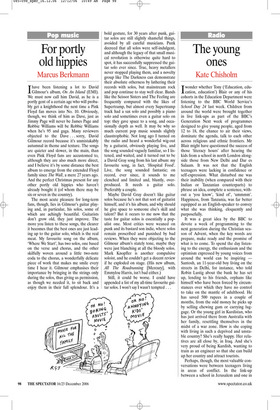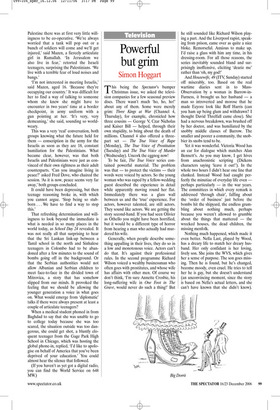The young ones
Kate Chisholm
Iwonder whether Tony (‘Education, education, education’) Blair or any of his cohorts in the Education Department were listening to the BBC World Service’s School Day 24 last week. Children from around the world were brought together in live link-ups as part of the BBC’s Generation Next week of programmes designed to give young people, aged from 12 to 18, the chance to air their views, dominate the agenda, talk to each other across religious and ethnic frontiers. Mr Blair might have questioned the success of those ‘literacy hours’ after hearing the kids from a school in north London alongside those from New Delhi and Dar es Salaam. It was not that the English teenagers were lacking in confidence or self-expression. What disturbed me was their inability (when compared with their Indian or Tanzanian counterparts) to phrase an idea, complete a sentence, without a ‘you know’, ‘kind of’, ‘ummmm’. Happiness, from Tanzania, was far better equipped as an English-speaker to convey what she was thinking, eloquently and purposefully.
It was a great idea by the BBC to devote a week of programming to the next generation during the Christian season of Advent, when the key words are prepare, make ready and the promise of what is to come. To spend the day listening to the energy, the enthusiasm and the optimism expressed by young voices from around the world can be inspiring Santosh, an 11-year-old boy living on the streets in Delhi, for instance, who told Robin Lustig about the bank he has set up, lending to his friends, orphans like himself who have been forced by circumstances over which they have no control to take on the mantle of adulthood. He has saved 500 rupees in a couple of months, from the odd money he picks up by selling chewing gum or carrying luggage. Or the young girl in Kurdistan, who has just arrived there from Australia with her family, resettling themselves in the midst of a war zone. How is she coping with living in such a deprived and unstable country? She’s really happy. Her relatives are all close by, in Iraq. And she’s very proud of being Kurdish, wanting to train as an engineer so that she can build up her country and attract tourists.
Perhaps, though, the most valuable conversations were between teenagers living in areas of conflict. In the link-up between a school in Jerusalem and one in Palestine there was at first very little willingness to be co-operative. ‘We’re always worried that a tank will pop out or a bunch of soldiers will come and we’ll get injured,’ said Mazen, a fiercely articulate girl in Ramallah. ‘In Jerusalem we also live in fear,’ retorted the Israeli teenagers, surprising the Palestinians. ‘We live with a terrible fear of loud noises and bangs.’ ‘I’m not interested in meeting Israelis,’ said Mazen, aged 16. ‘Because they’re occupying our country.’ It was difficult for her to find a way of talking to someone whom she knew she might have to encounter in two years’ time at a border checkpoint, in army uniform with a gun pointing at her. ‘It’s very, very demeaning,’ she said, sounding so worldweary.
This was a very ‘real’ conversation, both groups knowing what the future held for them — conscription in the army for the Israelis as soon as they are 18, constant humiliation for the Palestinians. What became clear, however, was that both Israelis and Palestinians were just as convinced of their own rightness as their adult counterparts. ‘Can you imagine living in peace?’ asked Fred Dove, who chaired the session. ‘As it is now, peace seems very far away,’ both groups concluded.
It could have been depressing, but then teenage reasoning broke in, with which you cannot argue. ‘Stop being so stubborn ... We have to find a way to stop this.’ That refreshing determination and willingness to look beyond the immediate is what is needed in so many places in the world today, as School Day 24 revealed. It was not really all that surprising to hear that the Sri Lankan link-up between a Tamil school in the north and Sinhalese teenagers in Colombo had to be abandoned after a few minutes to the sound of bombs going off in the background. Or that the Serbian authorities would not allow Albanian and Serbian children to meet face-to-face in the divided town of Mitrovica, a story that has somehow slipped from our minds. It provoked the feeling that we should be allowing the younger generation a voice in what goes on. What would emerge from ‘diplomatic’ talks if there were always present at least a couple of articulate teenagers?
When a medical student phoned in from Baghdad to say that she was unable to go to college today because she was too scared, the situation outside was too dangerous, she could get shot, a bluntly eloquent teenager from the Gage Park High School in Chicago, which was hosting the global phone-in, replied, ‘I’d like to apologise on behalf of America that you’ve been deprived of your education.’ You could almost hear the silence that followed.
(If you haven’t as yet got a digital radio, you can find the World Service on 648 MW.)







































































































































 Previous page
Previous page